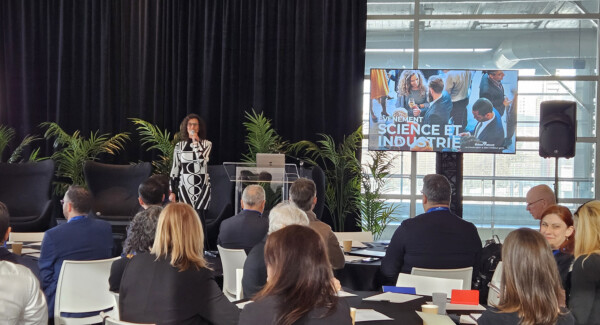Montreal: Differences persist between francophones, anglophones and allophones
FAVORIBookmarkMontreal, June 21, 2021 — When it comes to alcohol, there are still three distinct Montreals. Data gathered in 2021 confirm that the differences between francophones, anglophones and allophones observed in 2015 are still clearly present, with the gap between francophones and anglophones smaller than that separating them from allophones. And yet, taken as a group, Montrealers fall within the Quebec average in many regards.
These are the highlights of the Montreal region results, taken from the widest-reaching survey on drinking in Quebec. The survey, which examines the relationship between Quebecers and alcohol, region by region, is conducted every other year by CROP on behalf of Éduc’alcool.
QUOTE
“Many Montrealers recognize the negative impact of alcohol on their social relationships and physical health. This is surely a first step in the awareness process that leads to better drinking habits. However, drinking while impaired occurs is much more common in Montreal than the Quebec average. This behaviour is of concern because it affects everyone’s safety, and taking corrective action to combat this scourge is of the utmost importance.”
Hubert Sacy, Director General, Éduc’alcool
SURVEY RESULTS AT A GLANCE
Drinking habits: Francophones in Montreal drink more than those elsewhere in Quebec, while allophones drink less than the Quebec average.
- 82% of Montreal residents report having drunk alcohol at least once in the previous 12 months, which is just about the Quebec average (84%).
- These drinkers, however, are unevenly distributed among the population: 88% of francophones drank during the last year, compared to 79% of anglophones and 76% of allophones.
- 59% of all Montrealers drink an alcoholic beverage once a week or more, which is almost exactly the Quebec average of 60%.
- However, 68% of francophones drink alcohol once a week or more, compared to 54% of anglophones and 48% of allophones.
- As a group, Montreal drinkers have an average of 2.1 drinks a week, which is the Quebec average.
- Anglophone and allophone drinkers have 1.7 and 1.8 drinks, respectively, but francophone drinkers raise the average with their 2.5 drinks a week.
- Regarding the impact of their drinking, 10% of Montreal drinkers believe that it negatively affects their social life, 12% say it affects their family life, and 21% think it affects their physical health. These figures are higher than the Quebec averages of 7%, 9% and 17%, respectively.
- Figures are lower for Montreal allophone drinkers, with 5% saying it affects social life and 8%, family life.
- However, 18% of anglophone drinkers think their drinking affects their social life and family life.
- More francophone drinkers recognize the impact of alcohol on their physical health (24%).
Excessive drinking: Overall, excessive drinking in Montreal is about the same as the Quebec average, but the figures for individual language groups tell a slightly different story.
- Francophone Montrealers exceed the recommended limits more than the Quebec average:
- 46% say they exceeded the limits once a month or more (vs. 36% of Quebecers overall).
- 39% did not exceed the limits even once (vs. 47% of Quebecers overall).
- Anglophones are also above the average, although a little less so:
- 39% say they exceeded the limits once a month or more (vs. 36% of Quebecers overall).
- 44% did not exceed the limits even once (vs. 47% of Quebecers overall).
- Excessive drinking among allophones is clearly below the Quebec average:
- 23% say they exceeded the limits once a month or more (vs. 36% of Quebecers overall).
- 66% did not exceed the limits even once (vs. 47% of Quebecers overall).
Drinking and driving: Anglophones and allophonesin Montreal are more responsible than the Quebec average when it comes to driving after drinking. Francophones drink and drive more than the Quebec average.
- 44% of francophones say they have driven a vehicle after drinking alcohol (vs. 40% of Quebecers overall) compared to 32% of anglophones and 29% of allophones.
- 13% of francophone drivers have driven after drinking more than the legal limit. That is well above the Quebec average of 8%. The figure is 8% for anglophones and just 5% for allophones.
Driving and sobriety checkpoints: There is a 10-point gap between francophones and anglophones when it comes to assessing the possibility of being stopped by police at a roadside sobriety checkpoint.
- 45% of francophone Montrealers believe they may be stopped, compared to 55% of anglophones and 52% of allophones (vs. 48% of Quebecers overall).
- 21% of francophones and 23% of anglophones have seen a police checkpoint in the region in the last year (vs. 19% of Quebecers overall) but only 14% of allophones have.
- 20% of francophones and anglophones went through a roadside checkpoint in the last year, compared to only 6% of allophones (vs. 15% of Quebecers overall).
Alcohol and cannabis: Montrealers combine alcohol and cannabis more than the Quebec average.
- 31% of francophones use cannabis, compared to 22% of anglophones and 12% of allophones (vs. 21% of Quebecers overall).
- 35% of francophones who use cannabis and alcohol together combine the two always or often (vs. 28% of Quebecers overall);
- The same is true for 26% of anglophones and 29% of allophones who use cannabis and drink alcohol at the same time.
Éduc’alcool in Montreal: Éduc’alcool is pleased to note that the organization is known and recognized by Montrealers.
- The slogan, La modération a bien meilleur gout/Moderation is always in good taste is known by 3 out of every 4 Montrealers, including 9 out of 10 francophones.
- Éduc’alcool’s credibility in the Montreal region is in keeping with the Quebec average (93%).
In all, 1,200 people (500 francophones, 400 anglophones and 300 allophones) were surveyed in the Montreal region, for a total of 7,600 respondents across Quebec. However, three factors should be considered when interpreting the data, since they could influence the results.
- Government measures associated with COVID-19 may have modified some behaviours. For example, the ban on gatherings in private homes and the closing of bars and restaurants had an impact on where Quebecers drank alcohol.
- A change in the data collection method: In 2015 and 2017, the survey was conducted solely by telephone. In 2019, data was collected mostly online. People report more drinking when responding online than in a telephone interview, which therefore affects results. Also, the percentage of telephone interviews was higher in 2019 than in 2021 (32%vs. 9%), and that can also affect results.
- Removal of a seasonal bias: This year, data was collected from August through October 2020, and from February 15 to March 30, 2021, in order to reduce the influence of any particular month on the behaviour of respondents.
-30-





